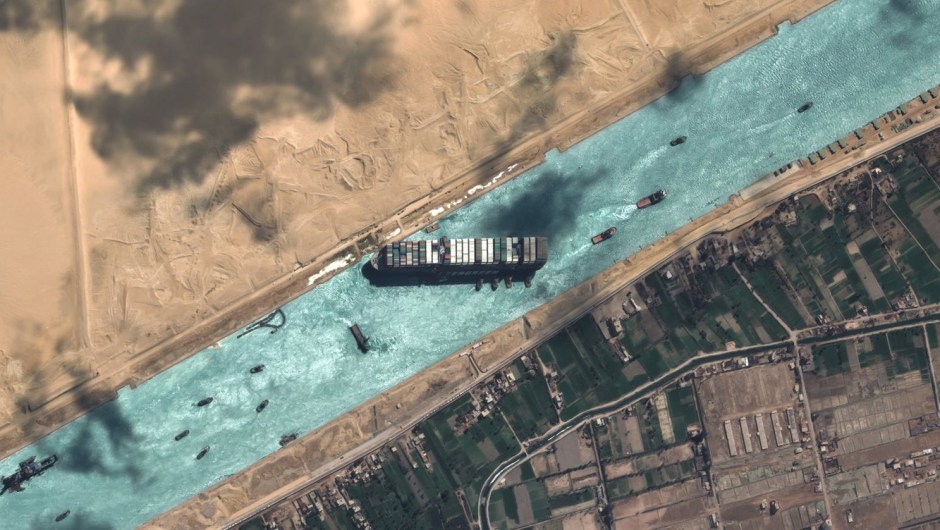This satellite image shows how the ship was stuck in the Suez Canal on Sunday.
(Credit: Maxar Technologies / AP)
Editor's note:
David Bittan Obadia is a lawyer, writer, political and international analyst, columnist for the Venezuelan newspaper El Universal, and a contributor to other media.
As a lecturer, he participated in the World Jewish Congress and was president of the Jewish community of Venezuela.
His Twitter account is @davidbittano.
The opinions expressed in this column are those of the author alone.
You can read more articles like this at cnne.com/opinion.
(CNN Spanish) - For
almost a week the Suez Canal, which connects the Mediterranean Sea with the Red Sea, was closed due to the jam of a ship weighing approximately 224,000 tons.
To get an idea of the magnitude of this problem, it is appropriate to highlight the following data: approximately 30% of the world's container volume transits the Suez Canal daily, approximately 12% of the total global trade of all merchandise.
These are some really impressive figures that help us understand the enormous significance of what happened.
1 of 10
|
This satellite image was taken on Monday, March 29, after the ship broke loose.
(Credit: European Space Imaging)
2 of 10
|
A group of children celebrate the release of the container ship Ever Given in the Suez Canal on Monday, March 29.
(Credit: Ahmad Hassan / AFP / Getty Images)
3 of 10
|
Tugboats accompany the container ship Ever Given as it proceeds through the canal on Monday, March 29.
(Credit: Suez Canal Authority / AP)
4 of 10
|
A group of people look at Ever Given on Monday.
(Credit: Mahmoud Khaled / Getty Images)
5 of 10
|
This satellite image shows how the ship was stuck in the Suez Canal on Sunday.
(Credit: Maxar Technologies / AP)
6 of 10
|
Tugboats attempt to unblock the ship on Sunday.
(Credit: Suez Canal Authority / EPA-EFA / Shutterstock)
7 of 10
|
Workers try to unlock the ship on Sunday.
(Credit: Suez Canal Authority / EPA-EFA / Shutterstock)
8 of 10
|
A tugboat operates the Ever Given on Sunday.
(Credit: Suez Canal Authority / EPA-EFA / Shutterstock)
9 of 10
|
A nighttime shot of Ever Given on Saturday March 27th.
(Credit: Fadell Dawod / picture alliance / Getty Images)
10 of 10
|
Ships remained anchored outside the Suez Canal in Egypt on Thursday.
The boats could not pass since the Ever Given blocked the route.
(Credit: Khaled Elfiqi / EPA-EFE / Shutterstock)
The losses from this traffic jam, even with the freeing of the canal, will be incalculable;
More than 300 ships full of merchandise had to wait to pass and things are not going as fast as they think.
Over time, economies will suffer and the shortage of some products will generate inflation in various corners of the world.
Today's world is not made to waste a minute.
This incident has shown to what extent the world depends on the so-called global distribution chain and, as Ilan Goldin, professor at the University of Oxford, points out: “As we become more interdependent, we are more subject to fragility. that arise, and are always unpredictable ”.
The world must be vigilant and focus on finding alternatives to maritime trade to secure the supply chain.
Perhaps globalization was covering us too quickly and issues such as the transit of goods did not seem to represent a problem;
this however has become a real headache, as a single ship brought world trade to its knees.
Perhaps globalization will have to be rethought, observing the regionalization of economies and placing greater emphasis on neighbors.
In the case of the United States, it is necessary to focus on its natural partners: Latin America, where there are great opportunities to explore, everything to do and immense reserves of natural resources.
The increased cost of transporting goods will give a greater margin to manufacture in countries other than China, where it is known that there is a blatant labor exploitation.
Alternative routes to the Suez Canal
One would be the Cape of Good Hope in southern Africa, where there are certainly a number of security risks in the face of the rise of maritime piracy and where distance is also becoming a problem;
the other is the Arctic route, but this, in addition to being longer, presents extreme weather characteristics.
At best, both options add cost, increased browsing time, and risk.
Air transport, meanwhile, would be unthinkable for so much movement.
LOOK: The supermoon of worms helped unblock the Suez Canal
The role of Moscow
Russia shows its intentions to get into the game, as always, and coincidentally has been promoting the Arctic route for a long time;
We must remember that in the Six Day War of 1967, in which Israel defeated Egypt, Syria and Jordan, the Suez Canal was closed for eight years;
There Russia benefited from the economic and also geopolitical point of view, and now the same will surely happen.
Reflection
This event has once again demonstrated the international sensitivity caused by globalization;
In addition, the alarms are activated, since this chapter becomes -with all certainty- an appetizing dish for terrorists in the Middle East, who on more than one occasion have threatened to block the passage through said channel.
It also offers a perspective on your eventual role as a player that could take advantage of this misfortune.









